Post hidden under the cut due to graphic depiction of police violence and childhood sexual assault. Please mind the trigger warnings.
I don't consider myself a talented reader for racial issues in a text; I'm white and racial issues are often well outside my lane. At the same time, I feel it is my responsibility as a white person to call out possible problematic issues in a text so that Black, Indigenous, and People of Color (BIPOC) reviewers aren't blindsided by problems when they go into the text later.
I said in my First Impressions portion of the review: "I have a theory which may or may not be correct: This book began as the story of a white woman (Jane) and her Black lesbian lover (Evangelyne), and whether or not Jane would chose Evangelyne over the man she married, with a gender rapture as the backdrop for this drama. Racially-diverse but not narratively-critical supporting POV characters were added in a second pass and fade out of the novel at about the halfway mark. Their actions have no effect on the narrative and only Jane's choice matters in the end." and I would like to now expand on that statement.
There are 5 Point of View (POV) characters in this novel whose thoughts we inhabit. One of the characters is white and receives the far larger share of pages, and her sections are written in first-person (I/me); the other characters are more racially diverse but have a much smaller share of pages, all written in third-person (she/her). The characters and their page counts are as follows:
Blanca Suarez. 14 year old girl with mystical connection to the hell-world containing the disappeared men. Dreams of the animal-demons. Mexican father, Korean mother. Quote: "I know I look totally Mexican, but I'm half Korean." Total pages: 5.5. Percent: 2%.
Ji-Won Park. I cannot find an age, ethnicity, or physical description for Ji-Won except: "She was the weird fat girl who couldn't meet your eye, who didn't speak at all or spoke too loud." and "a dumpy, frowning woman in a sweatshirt and basketball shorts, with a broad sad sensible face." She is an artist and a crackerjack tailor, providing the small group with internal decor. Total pages: 16.5. Percent: 6.1%.
Alma McCormick. 40 year old waitress who is the first to claim the empty mansion the women inhabit during their Netflix marathon of "The Men". Mexican mother, white (?) father. Quote: "Alma talked about their mother and her sudden fascination with her Mexican roots, when all the time they were growing up they had to be Americans, no hyphens allowed." Total pages: 19. Percent: 6.9%.
Ruth Goldstein. 53 year old Jewish woman who may be a retired homemaker? ("Ruth was fifty-three, broke, overweight, depressed, and her most glamorous ever job was managing a medical office in Chelsea.") Her son Peter is often mistakenly believed to be a Mexican migrant worker, explaining that he is "not Latino but Sephardic Jewish", yet when Ruth is in a Hispanic neighborhood she is described as white: "Ruth thought she was the only white person and felt a shameful jolt of racial paranoia." Total pages: 21.5. Percent: 7.8%.
Jane Pearson. 29 (?) year old blond white woman who is an unemployed homemaker. My best guess at her age is based on a college flashback in which she is 23, then announces being pregnant with the 5 year old child she loses in the disappearance. 23+(9 months)+5=~29. She is a tall, thin, pretty ex-ballerina whose first-person narrative is deeply self-conscious about her looks. Total pages: 182. Percent: 66.6%.
A sixth major character and our only Black woman is Evangelyne Moreau. She is not a POV character, but she does have an extended flashback of her life which is told to us filtered through Jane's voice. This flashback takes up 35.5 pages of Jane's 182 total, so if we were to be really generous we could drop Jane down to 146.5 pages and 53.6% of the novel. Yet I'm not really inclined to do so, because the POV is still clearly that of Jane's throughout.
It is worth noting that Jane joins the group of women at page 178. From that point on, Jane's narrative is the only one we receive; Ruth, Alma, Ji-Won, and Blanca all have some minor input into the narrative, but the POV character in each case is still Jane, so she can only tell us what the other women say and do, not what they might be thinking. Moreover, this is how Evangelyne is treated in Jane's sections: as a person whose words and actions are observed and filtered to us through Jane, with no input on her inner private thoughts. When Evangelyne is implied to have thoughts she doesn't share with Jane, those moments are seen as sinister and secretive, causing Jane emotional pain to have something held back from her--and all is resolved in Evangelyne's lengthy flashback section in which she comes clean about her past.
With all this in mind, we come to the question of whether "this book completely ignores white women's complicity in racialized violence". It's an important question to ask, given that the premise of the book is that the disappearance of all cis men leads to a utopia: is racism suddenly fixed once no cis men are around to perpetuate it? Lauren Hough assures us that the book addresses this issue and does not ignore it.
The most obvious specter of white woman violence in this book is probably Poppy Beacham. I covered this under the Lesbian Representation, but Poppy is a 22 year old white girl who begins dating 16 year old Evangelyne when Evangelyne was an inexperienced youth.
Poppy and Evangelyne live in Vermont (which is 96% white) and Evangelyne is being raised in a Black cult which is described in the narrative as "an innocent thing in the world". They sacrifice chickens and teach the children to shoot guns, and the white neighbors don't like this, but the police haven't done anything yet because they "weren't invited inside".
Evangelyne is a little embarrassed of the cult, in that way young teenagers are embarrassed by anything their parents are overly-enthusiastic about, but lives an otherwise idyllic childhood. She reads Foucault at home and was "preparing as a homeschooled student for early admission at Cornell". At night she and her brother and their two best friends drive the country roads and sing "Swing Low Sweet Chariot" together, enjoying the marvel of being alive in the glorious year of 1997.
Note: Nowhere in the novel are we given any indication of the current year. We have the date of the event (August 26) but the year and day are never mentioned. This was maddening to me as a reader, and I have only just realized that this flashback includes the first solid date I've seen in the book: 1997. We can math at this! We know Evangelyne is 16 in the flashback and after the disappearances she is described as "a heavyset woman of almost forty". That would set the disappearances in a 2019/2020 time frame, which means my speculation about the "2019" in the web address for "The Men" (www.themen82019231.com) being the year was right! You have no idea how excited this makes me. If you're curious what the teens were singing on the radio in 1997, well so was I. Thanks, Google.
Anyway. Evangelyne enjoys her puppy love relationship with Poppy until one fateful day when she tells Poppy about ancient Yoruba rituals in which animals and sometimes people were ritually sacrificed. Poppy--who is bipolar, hears voices that she calls "demons", and is often unmedicated--misunderstands and thinks that Evangelyne's family practices these sacrifices. Evangelyne insists that they only sacrifice chickens, never people, but Poppy tells her white family about the conversation. They decide to believe that the Black religious group are dangerous Satanists, and also possibly sex traffickers from Baltimore, because of racism.
The reason Evangelyne puts up with this treatment from Poppy, and the reason she credits Poppy with being "the white girl who taught Evangelyne what white meant" is because at 16 years old, genius though she is, she "didn't yet understand racism". She had decided that a few slurs at school were nothing much because all kids say vicious things, and that "racist" was an accusation adults came up with to stop you from having fun.
Now, look, I said before that I'm white so please take everything I'm about to say with a massive grain of salt. But I've watched so many Black parents talk about the hard conversations they've had to have with their very very young children about racism and how to stay safe in America from racist white people. Evangelyne is a brilliant young girl whose parents are college professors with deep interests and ties into Black culture, history, and civil rights. They have lived through the Rodney King trial and Los Angeles riots of 1992. They must have surely followed the O.J. Simpson murder case in 1994. Bill Clinton is president at this time and in less than a year from now (1998) Toni Morrison will call him "the first Black president" because of his support in the Black community and his focus on civil rights--a major reason Republicans hated him and his wife so very much.
How, in the midst of all this politicization of Blackness, has Evangelyne internalized at 16 that racism is nothing more than nasty names hurled harmlessly by schoolyard bullies (the example in-text given being "ghetto") and nice "redneck" families who served delicious sandwiches on Wonder bread? I'm not saying no Black child could pull this off, but (a) it doesn't fit the profile of Evangelyne and her family and (b) I'm not sure a white woman should be writing a Black character this way.
[TW: Rape, Cop Brutality] If you've read my Lesbian Representation post, you know what's coming next. Poppy calls on Evangelyne to help her, saying that her uncle is raping her at night but that he has friends with the cops so she can't rely on them to help a mentally ill girl. Evangelyne agrees to come pick up Poppy and her brother and their two best friends--three young Black men--all agree that the absolute best and wisest course of action is to drive secretly over to a racist white man's house, sneak around on the lawn, and help his white niece escape.
Poppy is, as I mentioned, unmedicated for her bipolar condition. She is also suffering severe PTSD from having been raped repeatedly by her Uncle and his friend--a stranger to her. She does not know the three young men that Evangelyne is bringing over, and has not been warned about them. When she sees three strange men in the yard waiting for her she screams and runs back to the house in a panic.
The youths escape miraculously unharmed and decide it would be best if the adults weren't told about the night's events. No one thinks there will be any consequences for what happened, even though they all know that Poppy has been telling her family in her confused, garbled way about the "Yoruba sacrifices" and the violent racist uncle with cop friends believes the Black family to all be Satanists.
[TW: Cop Violence] The community ratchets up the racism against the Black home, and ultimately the cops violently raid the place in a manner reminiscent of the Waco Texas raid against the Branch Davidians. Evangelyne is the only survivor and is sent to prison for killing two cops. In prison she is surrounded by white women who range from basically decent to ones who "treated her like their own child".
In prison she writes a book which is published by white people and catapults her out of jail and into college. She never experiences police violence again, as far as I can tell, until the night of her death when the white head of her Home Owners Association (HOA) calls the cops on her for trivial reasons. I would have thought that cops would keep tabs on a Black woman who killed two cops and got out early, but in this world that apparently does not happen. She becomes a political celebrity on campus and dates a series of girls who consider her a veritable messiah.
Here is how she meets Jane, the white protagonist: Jane unknowingly attends a core college class which several Black women students had arranged to be an all-Black-woman class so that they could have a place free from whiteness. When Evangelyne goes to confront Jane afterwards and politely ask her to drop the class, Jane panics and assumes Evangelyne recognizes Jane as a registered sex offender. So... she runs away, literally, and Evangelyne gives chase.
When Evangelyne realizes that Jane was afraid of her not for racist white woman reasons but for I'm-a-registered-sex-offender reasons, she falls instantly in love with the "pure" and "gentle" Jane. Jane herself believes the "pure" and "gentle" stuff to be self-aware overkill designed to milk money from white readers seeking forgiveness in Evangelyne's words; Evangelyne insists that the words are how she really feels and love is overwrought like that. The reader is left to decide who is right.
[TW: CSA] I've talk about Jane's sex offenses in earlier essays but it needs to be repeated here: an older man of color named Alain groomed her to fall in love with him. Once she was emotionally under his control, he bullied and emotionally abused her into "seducing" young boys and letting them penetrate her sexually while Alain watched. Jane took a passive role in the bedroom and let the boys be on top, but this is rape and not sex: the boys are absolutely too young to consent. Most of them are also underprivileged boys of color from foreign countries who Alain sends back so they can't report what happened to anyone.
Jane is presented to the readers as a victim and she is... of some things. Alain emotionally and verbally abused her, and was a skilled manipulator who started on her when she was just a child of eleven and had just joined the troupe. But she is still guilty of raping young Black and brown boys when she is eighteen and they are significantly younger. Jane never meaningfully comes to terms with her culpability for this. Indeed, she ends the novel *blaming* them alongside Alain for her victimization; Alain, for putting her in the hotel rooms with those boys, and the boys for being willing to fuck her but unwilling to defend her in court when she is put on trial for raping them.
These are the two white women, then, who Evangelyne loves: Poppy, whose racism led to the death of Evangelyne's entire family and Jane, who raped Black and brown boys and watched them be sent back home in shame, their dreams ruined and opportunities dashed. We certainly can't say the book "ignores" white women's complicity in racial violence, but how does the book depict that culpability?
Poppy is a complicated mess of mental illnesses, and it's unclear how lucid she was when she told her family about the Yoruba conversation with Evangelyne. After she is startled by the young men in her yard she lapses into a non-verbal PTSD episode which requires extensive hospitalization, so she can't even explain that the Black teens didn't harm her. Evangelyne blames her for the incident, but narratively the book could not bend over further to make this an "accident" of mental illness and abuse on Poppy's part, with the bear share of the racism coming from the uncle and cops. White men, in other words.
[TW: Rape] Jane is described as even more innocent than Poppy. Her sentence is presented to us as hugely, unfairly disproportionate to her crimes: her life is ruined, people spit on her in the streets, she is a pariah and free for all of humankind to abuse. A police officer rapes her and Jane worries that she'll be used freely by all the cops; she is relieved when they replace her rapist with a polite elderly officer who does not approve of what the other man has done. The cops, we see, aren't willing to arrest one of their own with no evidence, but they *will* take steps to make sure it doesn't happen again.
Evangelyne herself proclaims Jane innocent of all wrongdoing: "I was a victim of sexual abuse who'd been blamed for the crimes of a powerful male." She doesn't see Jane's whiteness protecting her from being thrown into jail forever, the way a Black woman would be. Nor does she see the broken lives of Black men in Jane's story, and the way Jane helped to rape and abuse them. She insists to the reader, and to Jane, that Jane is "pure". She insists that she means it, and that she loves Jane for that purity. I don't know what to make of that, but I don't like it.
From here, you know how the story ends if you've read my earlier reviews. Jane has to choose between Evangelyne and her husband, and either chooses Leo or fails to choose Evangelyne in time for the hell-door to close--I really do not know which interpretation is intended. Jane wakes up and the event has been reduced to a dream. Knowing that Evangelyne is moments away from being killed by cops, she moseys into town and eventually pulls out her cell phone in an attempt to warn her. But she is too late. Fox News already has the story. There is a very weird "joke" about search engines that I have no idea what to make of. If this is supposed to be an unwelcome intrusive thought, it's the only one Jane has had in the book.
There is one more thing on race and Blackness which needs to be said, and it is part of those strange hell-world scenes. When the men turn on their children and eat them, the narrative makes a big point of making sure we know that the first cannibalistic group is composed of Black men who are "ethnically West African".
This scene is either a morality test wherein some of the men are able to overcome the urge to consume the children and are passed on to the next level to continue their escape OR it is a test of the commitment and pity of the womanly watchers--the "Lot's Wives" who are holding open the door back. If it is the latter, then we must assume that sufficient womanly attention and pity is what grants the men the power to overcome their animalistic urges.
Either the Black men fail the test of character, or a Black woman has somewhere failed to pay sufficient attention to her men. Yet that seems almost laughable on the face of it, since Leo is able to resist and this is Jane's *first time* watching "The Men". If the attention and love of a first-timer is enough to save Leo, then surely whichever Black woman these men are associated with should be able to love one of them enough? Is Leo saved because Jane is "pure" when others are not? Or is Leo good and moral enough to resist because he is white? The races of the other men in Leo's circle are not noted, but three of them were Jane's former victims. And many (most?) of her victims were not white.
I'll end this here and I'm not sure if I'll be able to continue much farther. There are still plenty of representation issues that I haven't touched on (Blanca's stay in a children's hospital in Texas was FAR from my own experience in a children's hospital in Texas) but I'm not sure how much more of this book I can take. Fare well tonight and thank you for reading.
Um. Because the three distinct and different harassment waves I've endured since I began reviewing this book have made me nervous, I want to point out that I have been doing "book metrics" since 2011. Measuring how often characters talk is a thing I do.
Just in case someone starts pulling out Mean Girls gifs again and accuses me of being obsessive for this particular author. I've been writing about CS Lewis for 11 years and counting. I'm autistic and thorough.





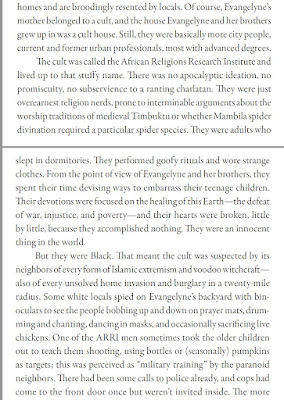



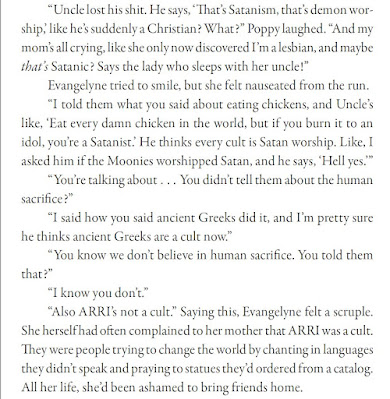

![Clinton drew strong support from the African American community and made improving race relations a major theme of his presidency.[23] In 1998, Nobel Prize-winning author Toni Morrison in The New Yorker called Clinton "the first Black president", saying, "Clinton displays almost every trope of blackness: single-parent household, born poor, working-class, saxophone-playing, McDonald's-and-junk-food-loving boy from Arkansas," and comparing Clinton's sex life, scrutinized despite his career accomplishments, to the stereotyping and double standards that blacks typically endure.[24]](https://blogger.googleusercontent.com/img/b/R29vZ2xl/AVvXsEiYESkKjyxASDh69hpTcIJDds3oftSKNyMglG4g4EEOU8Dbm3etT-BLbLj2j_5iakHRSpRw8f0c7QYE1sF496cLXUtR_vU0MOXaBBhosYOc4gwzfxNXssQXor7VPhzjD5kR2q55p7cFL6V9yobLttcELkk8BjPuuwnbf4yk4P3Jp4ghGS2W3QkdPEWjWQ/w400-h111/IMAGE-090.jpg)

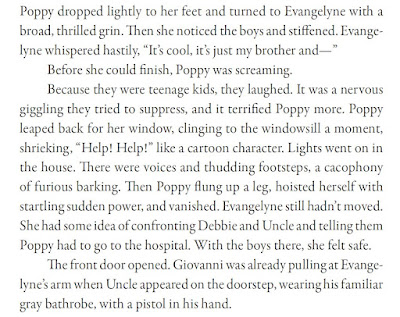
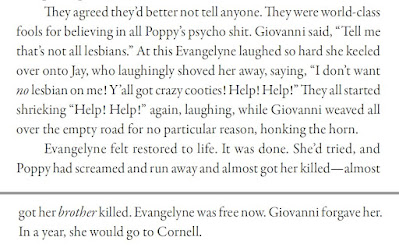



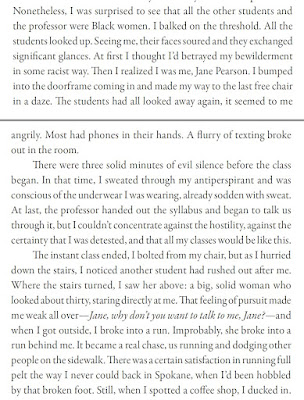


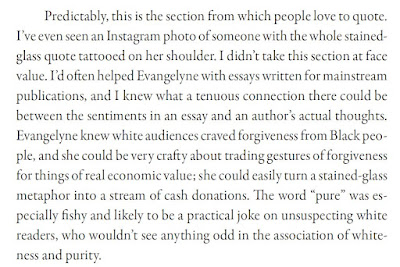





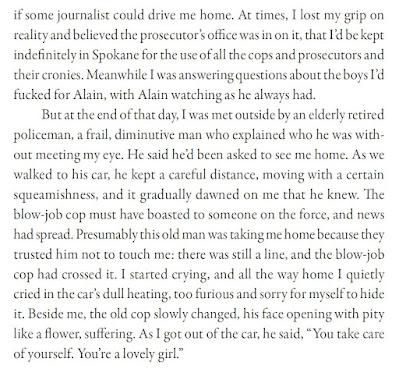



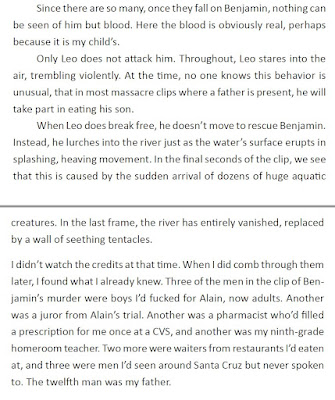


0 comments:
Post a Comment